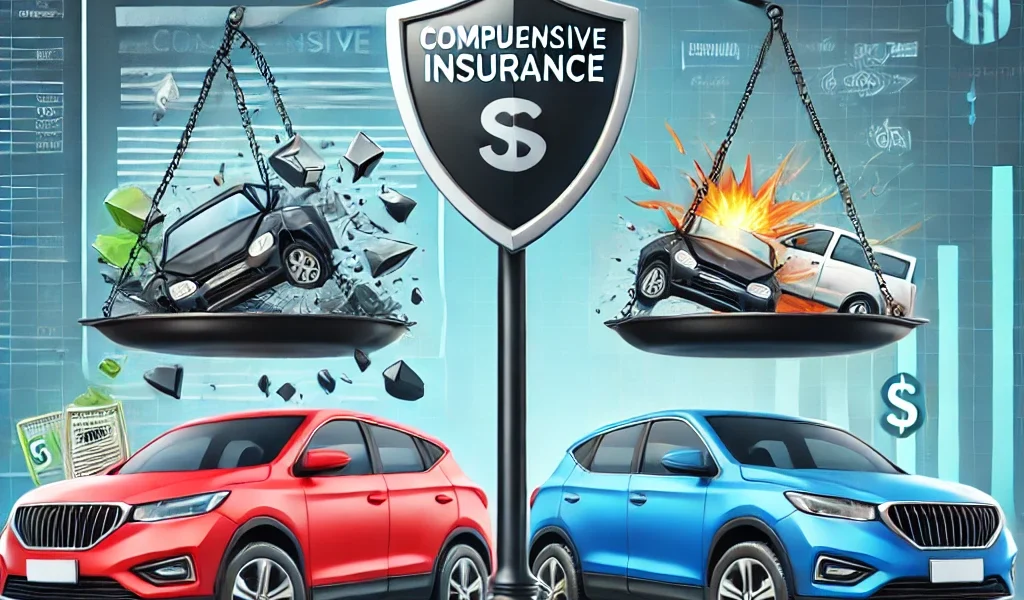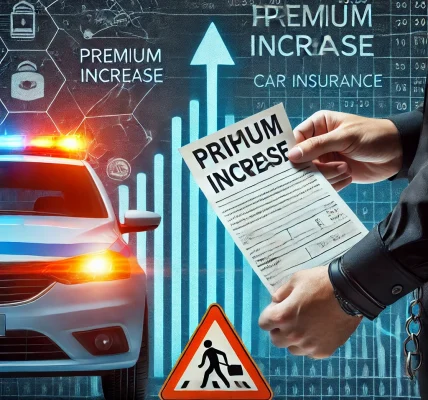When purchasing car insurance, understanding the differences between comprehensive and collision coverage is essential. Both types of coverage protect your vehicle from damage, but they apply in different situations. Choosing the right coverage depends on factors such as your car’s value, driving habits, and financial situation.
In this article, we’ll explore the key differences between comprehensive and collision insurance, their benefits, costs, and how to decide which one is best for you.
1. What is Comprehensive Insurance?
Comprehensive insurance covers vehicle damage that occurs from non-collision-related incidents. This type of coverage protects your car from various risks that are beyond your control.
What Does Comprehensive Insurance Cover?
- Natural Disasters: Damage caused by floods, hurricanes, tornadoes, hail, earthquakes, and wildfires.
- Theft and Vandalism: If your car is stolen or damaged by vandalism, comprehensive coverage helps with repair or replacement costs.
- Fire Damage: Covers vehicle damage caused by accidental fires.
- Falling Objects: If a tree branch, rock, or other object falls on your car, comprehensive coverage applies.
- Animal Collisions: If you hit a deer or other wildlife, comprehensive insurance covers the repairs.
- Glass and Windshield Damage: Many comprehensive policies cover broken or cracked windshields.
What Does Comprehensive Insurance NOT Cover?
- Damage from a car accident (this falls under collision insurance).
- Normal wear and tear, mechanical breakdowns, or tire damage.
- Injuries to you or other people (covered under liability or medical payments insurance).
2. What is Collision Insurance?
Collision insurance covers damage to your car resulting from a collision, regardless of fault. It helps pay for repairs or replacement if your vehicle is damaged in an accident.
What Does Collision Insurance Cover?
- Accidents with Another Vehicle: Covers damages if you collide with another car.
- Single-Vehicle Accidents: If you crash into a tree, pole, guardrail, or roll over, collision insurance applies.
- Hit-and-Run Accidents: Some policies cover hit-and-run incidents, but coverage depends on the insurer.
- Pothole Damage: If your car is damaged due to hitting a pothole, collision insurance helps cover the repairs.
What Does Collision Insurance NOT Cover?
- Damage from theft, fire, or vandalism (covered under comprehensive insurance).
- Medical expenses for injuries (covered under medical payments or personal injury protection).
- Damage to another driver’s vehicle (covered under liability insurance).
3. Key Differences Between Comprehensive and Collision Insurance
| Feature | Comprehensive Insurance | Collision Insurance |
|---|---|---|
| Covers theft | ✅ Yes | ❌ No |
| Covers fire damage | ✅ Yes | ❌ No |
| Covers accident-related damage | ❌ No | ✅ Yes |
| Covers animal collisions | ✅ Yes | ❌ No |
| Covers falling objects | ✅ Yes | ❌ No |
| Covers pothole damage | ❌ No | ✅ Yes |
| Required by lenders | ✅ Yes | ✅ Yes |
4. Cost Comparison: Comprehensive vs. Collision Insurance
The cost of both coverages varies based on factors such as your location, vehicle type, driving history, and deductible amount.
- Comprehensive Insurance: Generally cheaper than collision insurance since it covers incidents beyond your control.
- Collision Insurance: Typically more expensive than comprehensive coverage because accidents are more common than natural disasters or theft.
Deductibles and Premiums
- A higher deductible lowers your premium but increases out-of-pocket expenses if you file a claim.
- A lower deductible raises your premium but reduces upfront costs when making a claim.
5. Do You Need Comprehensive or Collision Insurance?
Determining whether you need comprehensive, collision, or both types of insurance depends on several factors:
When You Should Consider Comprehensive Insurance:
✅ Your car is new or expensive and costly to repair. ✅ You live in an area prone to natural disasters, theft, or vandalism. ✅ You park your car outside rather than in a garage. ✅ You want protection against unpredictable non-accident-related damage.
When You Should Consider Collision Insurance:
✅ You drive frequently, increasing the risk of accidents. ✅ Your car is valuable enough that repair costs would be high. ✅ You cannot afford to pay for repairs or a replacement out of pocket. ✅ You live in an area with high accident rates.
6. What If You Have an Older Car?
For older vehicles, the decision to purchase comprehensive or collision insurance depends on the car’s value.
- If your car’s value is less than 10 times your insurance premium, it may not be worth carrying full coverage.
- Consider dropping comprehensive and collision insurance if your car is worth less than $2,000.
- Use online tools like Kelley Blue Book to determine your car’s current market value.
7. When Are Comprehensive and Collision Insurance Required?
If you have a car loan or lease, your lender may require both comprehensive and collision insurance to protect their investment. Once you own the car outright, you can decide whether to keep these coverages.
8. Alternatives to Comprehensive and Collision Insurance
If you decide to drop comprehensive and collision insurance, consider these options:
- Emergency Savings Fund: Set aside money to cover repairs or vehicle replacement.
- Usage-Based Insurance (UBI): If you drive infrequently, UBI can help lower premiums.
- Gap Insurance: If you have a loan, gap insurance covers the difference between what you owe and the car’s market value if totaled.
9. Final Thoughts: Which Coverage is Right for You?
Choosing between comprehensive and collision insurance depends on your vehicle’s value, risk factors, and financial situation. Here’s a quick summary:
- If you want full protection for any event, opt for both coverages.
- If you are concerned about theft, weather, or vandalism, comprehensive insurance is ideal.
- If you want protection against accident-related damages, collision insurance is necessary.
- If your car is older and not worth much, you may consider dropping both coverages.
Before making a decision, evaluate your risk factors, compare insurance quotes, and consider consulting with an insurance professional to find the best policy for your needs.
Would you like personalized advice on choosing car insurance coverage? Let us know in the comments below!



